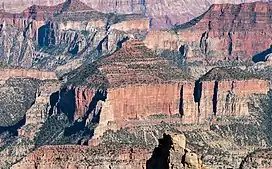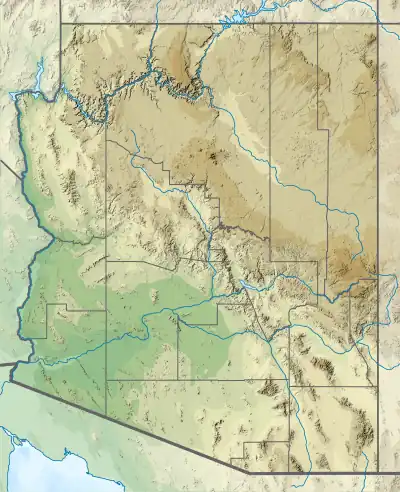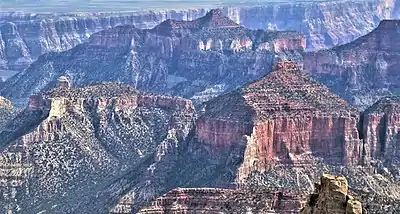| Colter Butte | |
|---|---|
 Colter Butte centered. Northwest aspect as seen from Point Imperial. (summit spire of Mount Hayden in foreground) | |
| Highest point | |
| Elevation | 7,254 ft (2,211 m)[1] |
| Prominence | 994 ft (303 m)[1] |
| Parent peak | Alsap Butte (7,500 ft)[1] |
| Isolation | 1.94 mi (3.12 km)[1] |
| Coordinates | 36°14′12″N 111°55′09″W / 36.2368047°N 111.9190839°W[2] |
| Geography | |
 Colter Butte Location in Arizona  Colter Butte Colter Butte (the United States) | |
| Location | Grand Canyon National Park Coconino County, Arizona, US |
| Parent range | Kaibab Plateau Colorado Plateau |
| Topo map | USGS Walhalla Plateau |
| Geology | |
| Type of rock | sandstone, limestone, shale |
Colter Butte is a 7,254-foot-elevation (2,211-meter) summit located in the Grand Canyon in Coconino County of northern Arizona, US.[2] It is situated four miles southeast of Point Imperial, where it towers 3,600 feet (1,100 meters) above Nankoweap Canyon. Its neighbors include Brady Peak, 2.5 miles to the west-northwest, Alsap Butte two miles to the northwest, and Swilling Butte one-half mile to the east. Colter Butte is named after James G. H. Colter (1844–1922), born in Nova Scotia, Canada, he came to the Arizona Territory in 1872 as a pioneer, farmer, cattleman, Apache and desperado fighter.[2][3] He was the father of Arizona state senator Fred Colter.[4] This geographical feature's name was officially adopted in 1932 by the United States Board on Geographic Names.[2] According to the Köppen climate classification system, Colter Butte is located in a cold semi-arid climate zone.[5] This butte is composed of Pennsylvanian-Permian Supai Group which overlays cliff-forming Mississippian Redwall Limestone, which in turn overlays slope-forming Cambrian Tonto Group.[6] Precipitation runoff from this feature drains east to the Colorado River via Nankoweap Creek on the north side and Kwagunt Creek from the south slope.
See also

References
- 1 2 3 4 "Colter Butte – 7,254' AZ". Lists of John. Retrieved 2021-03-18.
- 1 2 3 4 "Colter Butte". Geographic Names Information System. United States Geological Survey, United States Department of the Interior. Retrieved 2021-03-18.
- ↑ Gregory McNamee, Grand Canyon Place Names, 1997, Mountaineers Publisher, ISBN 9780898865332, page 37.
- ↑ Will C. Barnes, Arizona Place Names, 1988, University of Arizona Press, page 105.
- ↑ Peel, M. C.; Finlayson, B. L.; McMahon, T. A. (2007). "Updated world map of the Köppen−Geiger climate classification". Hydrol. Earth Syst. Sci. 11. ISSN 1027-5606.
- ↑ William Kenneth Hamblin, Anatomy of the Grand Canyon: Panoramas of the Canyon's Geology, 2008, Grand Canyon Association Publisher, ISBN 9781934656013